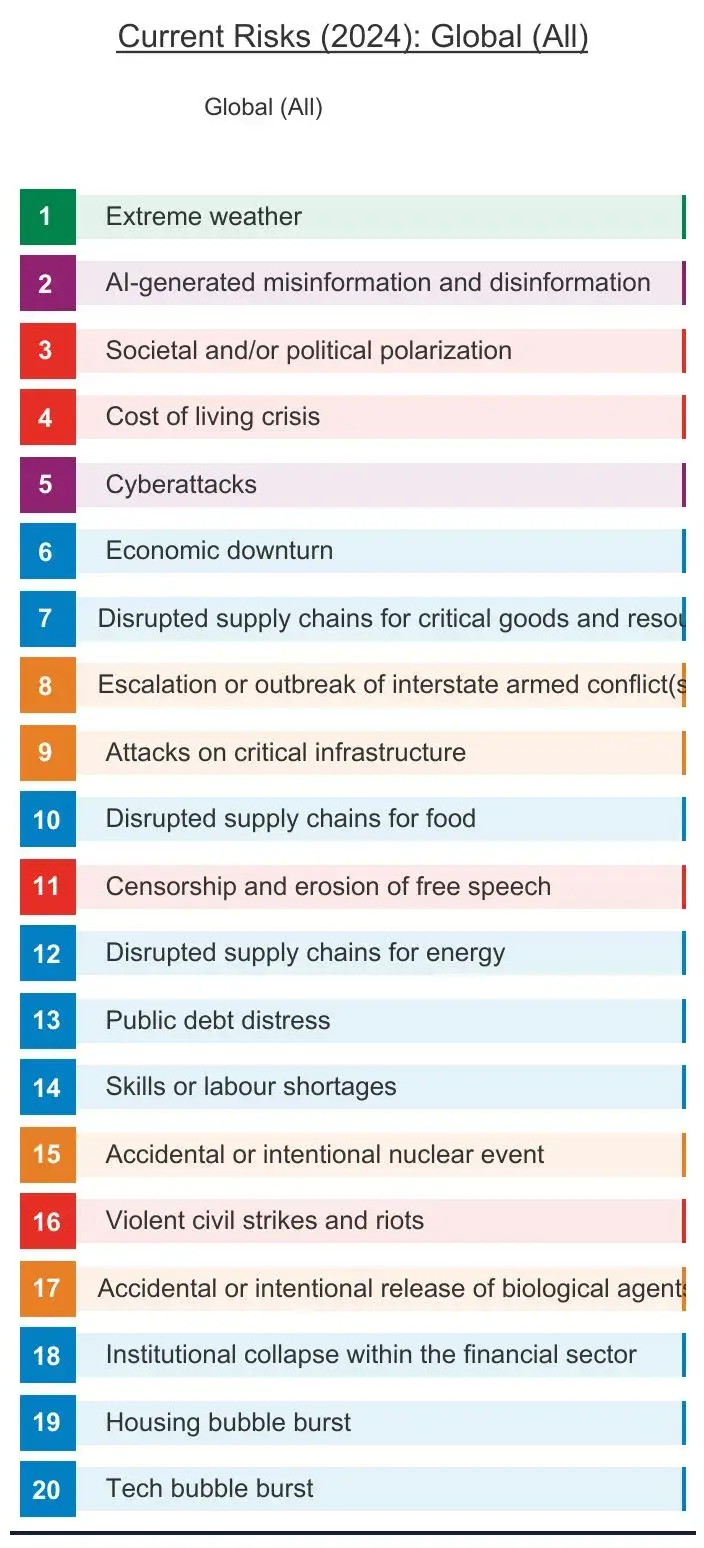
Global Risks Report 2024: Short- and Long- Term Threats to Expect

This week, the World Economic Forum published a 2024 Global Risks Report ahead of its 54th annual meeting in Davos, Switzerland. The report sheds light on pressing global challenges and is based on insights from nearly 1,500 experts, policymakers, and leaders.
Topping the list of global challenges are cybercrime, adverse impacts of Artificial Intelligence, and extreme weather events. While these risks are significant, experts highlight our growing capability to respond.
The report identifies significant forces—climate change, demographic shifts, technology, and geopolitics—that destabilize the world. Immediate consequences include extreme weather, AI-driven misinformation, a cost-of-living crisis, cyber threats, and socio-political polarization. In 2024, extreme weather events, AI-generated disinformation, and cyber security disparities take centre stage.

The top three long-term risks involve abrupt Earth system changes, biodiversity loss, and ecosystem collapse, interlinked and mutually reinforcing. The World Economic Forum recommends swifter carbon emission reduction as a solution to the deteriorating climate conditions.
Nations are encouraged to develop comprehensive adaptation strategies as we approach potential climate tipping points. The consequences of rising sea levels and other threatening changes can be minimized this way.
Technology was another sector identified as posing a global risk in 2024, especially with the ‘fever’ of AI spreading worldwide. The report projects that AI poses a dual challenge. Firstly, the immediate threat is AI-driven misinformation, which stands as the most significant risk to the global economy. The rise of generative AI chatbots, like ChatGPT, facilitates the creation of sophisticated synthetic content, heightening manipulation risks.
Secondly, AI widens cyber security inequalities. The increasing gap between organizations equipped for cyber resilience and those susceptible to cyber threats is a growing concern. This cyber equity gap is expected to have significant social impacts in 2024, particularly as cybercrime increasingly intersects with violent crime.
Cyber attackers are notably leveraging tools like Generative AI to carry out hideous crimes. A notable example is the August 2023 report by the UN on over 220,000 people trafficked in Southeast Asia for running online scams. Initiatives for responsible AI use, international collaboration, and diplomatic efforts aim to manage these risks.
Lack of economic opportunities, inflation and involuntary migration, highlighted as imminent risks, plague developing nations already. Economies of developing countries like Zimbabwe, Malawi, Lebanon, and Nigeria are on a downward spiral as their native currencies increasingly become devalued. Geared by a desire for better living, millions of people migrate every year.
In 2026, WEF’s expectation is that these challenges will exacerbate. Proactive solutions can, however, be engineered. The report emphasizes the importance of global cooperation, stakeholder engagement, and responsible technology development to ensure a secure and sustainable future.
Read more: Alleged Fraud: Tinubu Suspends N-Power, School Feeding, Others For Six Weeks
About The Author
Related Articles
Burkina Faso Increases State Stake to 40 Percent in Kiaka Gold Mine
The government of Burkina Faso has strengthened its role in the country’s...
ByWest Africa WeeklyFebruary 23, 2026Russia Delivers $345,000 in Military and Humanitarian Aid to Burkina Faso
The government of Burkina Faso has received strategic support from Russia aimed...
ByWest Africa WeeklyFebruary 23, 2026Drone Attack Attempt Foiled Near Aguelhok as Two FLA-JNIM Fighters Killed in Explosion
An attempted armed attack on a Malian military convoy near Aguelhok in...
ByWest Africa WeeklyFebruary 23, 2026Assimi Goïta Places AES at the Core of Mali’s New Foreign Policy Strategy
Mali’s transitional president, Assimi Goïta, has formally placed the Confederation of the...
ByWest Africa WeeklyFebruary 23, 2026











